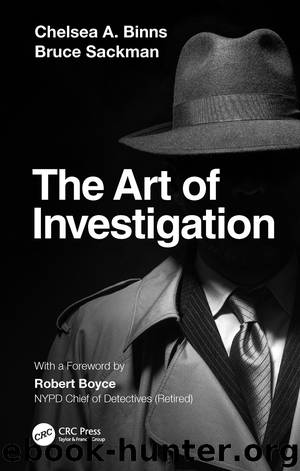The Art of Investigation by Unknown

Author:Unknown
Language: eng
Format: epub
Publisher: Taylor and Francis
Chapter 9
Adaptability
Cynthia Navarro
My professional career trajectory as an investigator demonstrates my personal adaptability. I have worked in several investigative capacities over the years, and performed my job using many different modalities. I started out as an undercover investigator, then worked as a background check investigator, and today I manage high technology cases. My career has spanned several distinct eras, (1970s–present) and thus my techniques evolved along with it. I think you will enjoy reading my story which demonstrates the importance of being adaptable as an investigator.
Adaptability. This one word describes an important skill which a successful investigator must have. The best definition I’ve found for adaptability is: an ability to change or be changed in order to fit or work better in some situation or for some purpose.1
My story in adaptability as an investigator started with my initial intent to go to law school. As you will see, I completely adapted my intended career path to an entirely new career objective. One day, while waiting to get a law school application, I was browsing a bulletin board, and there it was—an advertisement looking for a part-time investigator. This was a perfect opportunity for me, as I was still in school, completing my senior year. At this time, I had already been working part-time as an undercover investigator for a California state agency. However, the work was sporadic, and I really needed to make additional money, so another part-time job in this industry sounded ideal. I grabbed both the advertisement and my application for law school. Little did I know at that moment; my dream of law school would soon fade.
I got that part-time investigator job and ultimately completed my Bachelor of Science degree in Criminal Justice. Despite starting that job as a part-time employee, I worked my way up in the company to become a manager. For the next nine years I had a very exciting career. I worked for the same Vice President, in three different companies. I also reached a very important milestone in the process. In this organization, which had over 80 offices, I became the very first female investigative manager.
In 1989, I obtained my private investigator’s license. Although it sounds like a glamorous career path, it wasn’t all fun and games. I worked extremely hard, constantly adapting my skill-set to my environment. Like many new investigators, I hit the ground running. There was no training or adjustment period. I was essentially told to “run and figure it out as you go” and the ability to adapt to my given situation served me very well.
Starting with my first investigative job, I was constantly adapting to the evolving technology. You will see from this story how investigations have evolved with the advent of technology. While attending college, I worked part-time as an undercover investigator with a state agency. The process went something like this. They would call me on my telephone at home and provide me with the background information I needed to get started, which I wrote down using pencil and paper.
Download
This site does not store any files on its server. We only index and link to content provided by other sites. Please contact the content providers to delete copyright contents if any and email us, we'll remove relevant links or contents immediately.
Kathy Andrews Collection by Kathy Andrews(10527)
The remains of the day by Kazuo Ishiguro(7558)
Spare by Prince Harry The Duke of Sussex(4202)
Paper Towns by Green John(4171)
The Body: A Guide for Occupants by Bill Bryson(3803)
Be in a Treehouse by Pete Nelson(3216)
Harry Potter and the Goblet Of Fire by J.K. Rowling(3051)
Goodbye Paradise(2966)
Never by Ken Follett(2887)
Into Thin Air by Jon Krakauer(2704)
The Remains of the Day by Kazuo Ishiguro(2622)
The Genius of Japanese Carpentry by Azby Brown(2610)
The Cellar by Natasha Preston(2597)
Drawing Shortcuts: Developing Quick Drawing Skills Using Today's Technology by Leggitt Jim(2532)
120 Days of Sodom by Marquis de Sade(2441)
Architecture 101 by Nicole Bridge(2353)
The Man Who Died Twice by Richard Osman(2301)
Machine Learning at Scale with H2O by Gregory Keys | David Whiting(2295)
Fairy Tale by Stephen King(2073)
